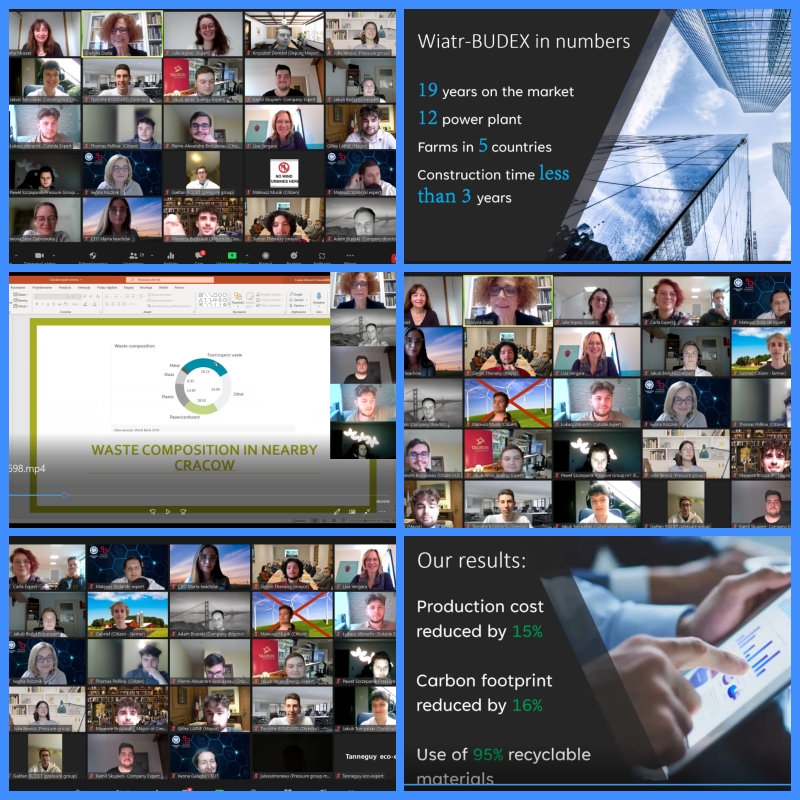Telecollaborations
* On April 27, 2022 the final presentation of the international telecollaboration project 'Call to Tender' took place on the Zoom platform. The aim of the project was to develop a scenario for a meeting of the city council of a small town in order to discuss the construction of a controversial investment that would entail serious disturbances in the area and would require approval by the city council. The examples of possible investments selected by students are as follows:
- a wind turbine park
- a nuclear power plant
- a sewage treatment plant
The project, as part of the English language course, was attended by second-year students of the Faculty of Environmental and Power Engineering of the Silesian University of Technology under the direction of Ms Grażyna Duda, MA, and students of Environmental Sciences from the ICAM University in Nantes in France under the direction of Ms Colette Mosse Keane, MA.
The project lasted for 5 weeks (from March 23 to April 27, 2022). The students worked online in three eight-person international teams to prepare a 30-minute city council meeting with the mayor and deputy mayor, the managing director of the contracted company, and a senior engineer or expert. In addition, the meeting was attended by lobbyists who were against the investment and experts in the field. The students had to decide who would play what role at the meeting and prepare what they would say to play their role as fully as possible, e.g. the mayor had to anticipate what the right questions would be, the contractor had to prepare convincing arguments, the lobbyist had to be credible and convincing, and the experts had to have in-depth knowledge of the field. This meant that students had to work individually and in teams during the preparatory phase. The final presentation of the project in the form of a city council meeting was organized on the Zoom platform in the presence of teachers from the Silesian University of Technology and ICAM.
The ‘Call to Tender’ project aimed to deepen the engineering, linguistic and cultural knowledge and skills of students, such as:
- Convincing a potential client to award him a contract for an engineering project by building credibility, demonstrating knowledge of the field and skills necessary for good execution of this project.
- Ability to present to the client the benefits of the presented proposals.
- Ability to defend these proposals when challenged by the opposition.
- Asking the right questions and answering them.
- Recognizing and challenging potential flaws in the proposal.
- Obtaining a holistic vision of an engineering project by looking at it from the perspective of various interests: political, economic, environmental, social, etc.
- Doing research, selecting and using relevant engineering information to obtain a contract.
- Finding sustainable solutions to various problems and challenges of the 21st century.
- Ability to manage projects.
- Managing the project by setting goals, adhering to the schedule, delegating tasks, meeting deadlines.
- Developing adaptability by finding solutions to unexpected obstacles.
- Active participation in an international project by scripting, interacting and negotiating with engineering students from another country.
- Raising awareness of cultural similarities and differences in sustainable solutions to environmental and economic challenges.
- Raising awareness of engineering realities in another country.
- Developing the ability to present and defend a point of view in a firm but diplomatic way in English.
- Developing rhetorical skills by persuading other participants to their own point of view.

----------------------------------------------------------------------------------------------------------------
* On the 14th of January 2022, at 8.30 in Poland and 16.30 in Japan, on the Zoom platform, took place the final presentation summarising the international telecollaborative project 'Karakuri-ningyō – mechanical dolls' carried out in the winter semester 2021/22 in cooperation with Otaru University of Commerce in Japan.
The participants of the project were the second-year students of the Faculty of Automatic Control, Electronics and Computer Science, majoring in Automatic Control and Robotics who were involved in the project as part of their English course in the winter semester, together with Japanese students of Commerce.
The project was coordinated by Iwona Seta-Dąbrowska, MA, (Foreign Languages Centre) and Prof. Daniela Caluinau from Japan.
The participants of the project worked in four international teams. Their task was to design objects inspired by traditional Japanese mechanical dolls (Karakuri-ningyō) which are considered to be the first Japanese humanoid robots.
The objects created by the students are based on the mechanism of mechanical dolls but they have entirely new applications and the range of users.
The international teams have come up with interesting solutions such as the concept of mechanical cart serving food and drinks in waiter-less restaurants, mechanical doll associated with the Silesian tradition of St. Barbara, a baby carriage, available in various colour versions, which can put the child to sleep and the Christmas toy - Santa giving away the presents.
The topic of the project was an interesting proposal for the students of Automatic Control and Robotics, who could use their knowledge and imagination for practical solutions connected with their field of study.
It was the fifth edition of the international cooperation with the university in Japan and we hope to continue this fruitful collaboration with the future projects.

_____________________________________________________________________
* On December 8, 2021 at 12.15, the Final Presentation of the international telecollaboration project "The SapperBot Project" was held simultaneously at the Foreign Language Centre and on the ZOOM platform. The aim of the project was twofold: to design a prototype of a robot detecting mines and other explosives and to find a market for this type of device.
The project was conducted as part of an English language course from October 13 to December 8, 2021. The participants of the project were second-year students of the Faculty of Mechanical Engineering and the Faculty of Automatic Control, Electronics and Computer Science at the Silesian University of Technology and students of the University of Economics in Budapest. The Polish students worked under the supervision of Grażyna Duda, MA, while the Hungarians were supervised by Dr. Ildiko Dosa.
The students worked together in four international teams, performing engineering and business tasks, as well as sharing knowledge in the above-mentioned fields. Our students learned how to create a business plan and find buyers for the devices they designed, while Hungarian students learned about the product they had to find a market for, which made it very easy for them to create an appropriate marketing strategy.
The project was the next instalment of international telecollaboration projects carried out using the PBL method at the Foreign Languages Centre.

_____________________________________________________________________








